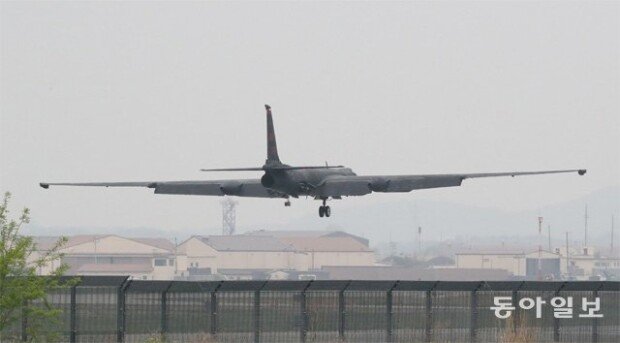U.S. reconnaissance resources could increase pressure on S. Korea’s defense burden
U.S. reconnaissance resources could increase pressure on S. Korea’s defense burden
Posted May. 06, 2020 07:42,
Updated May. 06, 2020 07:42

U.S. reconnaissance resources may be used as a bargaining chip of the U.S. side for later negotiations on the Special Measures Agreement (SMA), said diplomatic sources. A growing number of people are saying that the South Korean government should develop plans to address the U.S.’s claim that the mass utilization of its reconnaissance resources has been a help to South Korea.
Both countries agree that the U.S.’s reconnaissance resources have played a role in identifying Kim Jong Un’s movements since he went under the radar after a Political Bureau meeting on April 11. It has been known that at least eight types of reconnaissance planes flew over 50 times to thoroughly monitor any developments in North Korea for 20 days until Kim showed up to the opening ceremony of a fertilizer plant in Sunchon, South Pyongan province last Friday. On the day of April 27 alone, five U.S. reconnaissance planes flew over the Korean Peninsula.
A total of four reconnaissance planes were deployed last Friday when Kim appeared at the fertilizer plant. Some of the findings from such tight monitoring were shared with the South Korean government, which is why the South Korean government could confidently say that there was no unusual development in the North in addition to its internal intelligence. “The majority of the U.S.’s reconnaissance resources dedicated to Northeast Asia were deployed to the Korean Peninsula to identify Kim Jong Un’s movements,” said a diplomatic source.
“As the SMA negotiations have practically gone back to the starting point, U.S. President Donald Trump is likely to focus on the fact the reconnaissance resources have helped South Korea,” said another diplomatic source. “The supplementary resources that are provided by the U.S. as South Korean cannot develop on its own are also one of the reasons for raising South Korea’s defense cost share,” James DeHart, the top U.S. negotiator, said in November last year when the tension between Seoul and Washington was at its highest.
The South Korean government is maintaining the stance that such a demand from the U.S. cannot be accepted even if it is brought up again at a negotiation table. “It is unclear whether the U.S. will make a demand in relation to the recent utilization of reconnaissance resources,” said a South Korean diplomatic official. “South Korea’s position that such a demand cannot be accepted is based on the negotiation principles of the SMA.”
Gi-Jae Han record@donga.com · Kyu-Jin Shin newjin@donga.com







